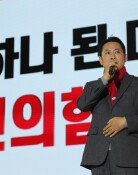[Exclusive] Obama calls FTA with S.Korea `win accord`
[Exclusive] Obama calls FTA with S.Korea `win accord`
Posted October. 14, 2011 10:53,
U.S. President Barack Obama said Tuesday that the free trade agreement with South Korea is an important accord that will not only remove barriers in exchanges of goods, services, investment and intellectual property but also create jobs and expand economic opportunities.
In a nutshell, it is a win accord that can give benefits to both countries, he said in a written interview with The Dong-A Ilbo Tuesday, the first day of South Korean President Lee Myung-baks state visit to Washington.
Obama also said the agreement is drawing bipartisan support in U.S. Congress and that he wants to tell Korean lawmakers that such backing signifies Washingtons commitment to the bilateral alliance.
▼Full Script▼
President Barack Obama Interview
1. What do the United States and South Korea need to do to strengthen their alliance?
Since I took office, President Lee and I have worked closely to revitalize the strong alliance between our countries, which is based upon common values, shared national interests, the bonds of common sacrifice during the Korean War, and the ties between our people, such as our students, which continue to grow. Central to this strengthening of the Alliance has been the close coordination and cooperation between our two governments on critical security, diplomatic, economic, trade, and other issues. Today, our alliance is stronger than it`s ever been, and that is why I am honored to welcome President Lee to Washington DC for this State Visit. Our close cooperation has laid a solid foundation for continued progress in the bilateral relationship for years to come. Moreover, the passage of the U.S.-Korea Free Trade Agreement will further strengthen the comprehensive partnership between our two nations.
2. Have there been occasions through which you and President Lee Myung-bak form close relationship?
It is certainly true that President Lee and I have developed a close and positive relationship during our work together, including the G-20 Summit, which was such a success because of his personal leadership. I consider President Lee not only a global partner, but a friend. He has shared with me his moving personal story of his rise from poverty to success in business and ultimately as a political leader and statesman. His success, like the success of the Korean nation, is a model of determination and resourcefulness that has inspired the world. Lastly, President Lee is a good friend of the United States, and I very much appreciate his support and friendship.
3. The KORUS Free Trade Agreement bill will be passed in the US Congress in a few days. How will it benefit the economies of the U.S. and South Korea?
The KORUS FTA is a tremendously important agreement that will lead to the creation of jobs and economic opportunity for Americans and Koreans by eliminating barriers to the flow of goods, services, investment, and intellectual property. It is a "win"for both our countries, which will have greater access to each other`s markets, which will in turn mean more jobs on both sides of the Pacific. It is also a model for the kind of trade agreements we need in the 21st century with strong protections for workers and the environment. The agreement will also deepen the close ties between our two countries, and create an enduring economic pillar to our bilateral partnership.
4. Do you have any advice to the Korean National Assembly which has yet to pass the FTA bill?
As a foreign leader, it would not be appropriate for me to give advice to the Korea National Assembly, which must make its own decisions based on South Korea`s national interest. I would simply say that there has been strong bipartisan support for this agreement in the U.S. Congress, and I hope our friends in Korea`s National Assembly will understand that is a sign of American commitment to this agreement and to our alliance.
5. The additional opening of the beef market has always been a sensitive issue in Korea. Some people in Korea predict that once the FTA is implemented, the U.S. will press for the entire opening of the beef market. What is your thought on this?
As for beef, we look forward to working with the Korean Government to continue to implement our agreement, again, in a manner that is a "win" for both our countries
6. You have mentioned many times that, just like many Americans drive Hyundai and Kia, you`d like to see more American automobiles, like Ford and Chevy, in Korean roads. Why do you think American automobiles have had some difficulties in penetrating the Korean market?
I think it`s widely understood that as Korea was developing its economy in the decades after the Korean War, it was pretty effective at finding ways to build up its industrial base, in part by restricting imports. In recent times, that has changed for the better, but certain elements of that old system still remain, which have made it hard and costly to bring imported cars to Korea at a reasonable price. may be less of a problem if you`re selling luxury cars, but for mainstream U.S. car companies like Ford and Chevy who are trying to compete with Hyundai and Kia, those added costs have been a problem. `m pleased to say that the KORUS agreement will address these remaining barriers, and make it easier for U.S. car companies to bring their cars to Korea and give Korean consumers more choices. U.S. car companies like Ford and Chevrolet are successful in markets all around the world, and we believe that as the barriers to the Korean market are eliminated, they will be successful in Korea too.
7. You have praised in many occasions Korean education. What makes in your view the Korean education system strong? What should the US learn from Korea to improve its educational standards?
In the United States we are very proud of our system of higher education. We are home to many of the world`s leading colleges and universities, and we are blessed with many talented students from many countries, including Korea. At the same time, South Korea`s commitment to education is known and admired around the world. The respect that Korean society accords its teachers is an example that other countries can learn from. As I noted in my 2011 State of the Union address, in South Korea, teachers are known as "nation builders," and here in America, it`s time we treated the people who educate our children with the same level of respect. In that address, I also underscored that the responsibility for the education of our children belongs in our homes and communities.
8. I wonder from which channels you have acquired information on Korean education. In spite of your praise of Korean education, many Koreans still think the quality of US education is superior to Korean one. What`s your thought on this?
President Lee has described for me how education transformed his life and how Korean parents are passionate about the education of their children. I believe that both of our countries have valuable lessons we can learn from each other`s education systems.
9.To lessen the tension in the Korean peninsula, what about South Korea and North Korea having summit talks?
We support efforts by both sides to improve relations between South and North Korea. The strength of the U.S.-ROK alliance, and the close coordination on North Korea policy between us, are critical to stability on the Korean Peninsula and create a framework for constructive engagement between Seoul and Pyongyang. Despite repeated provocations by the North and the loss of innocent South Korean lives, South Korea has shown extraordinary restraint and patience.
10. Do you think the six-party talks on North Korea denuclearization is on the horizon? What are the prerequisites of North Korea coming to the negotiation table?
Our message to North Korea has been clear and consistent: North Korea can either achieve security and respect by finally fulfilling its international obligations, or it can continue to flout its responsibilities and face even greater isolation. We remain committed to the verifiable denuclearization of the Korean Peninsula in a peaceful manner through the Six-Party Talks. North Korea has a long record of broken promises. It is not living up to the commitments it made in the Six-Party Talks and is violating the UN Security Council Resolutions. As a result, we and our partners including the Republic of Korea and Japan - are looking for indications that North Korea is ready to engage in negotiations with a seriousness of purpose necessary to make progress towards denuclearization.
11. Do you think bilateral meetings are needed between the US and North Korea in parallel with the six-party talks?
Within the Six-Party process, the issues of interest to all parties can be addressed, and there are opportunities for countries to address bilateral issues of concern, but North Korea must halt its provocative behavior and demonstrate that it is prepared to enter into serious negotiations.
12. Does the US have concrete schedules for food aid to North Korea at this point?
North Korea`s inability to feed its own people is the tragic result of its flawed policies and skewed priorities. The United States is still considering North Korea`s request for emergency food aid. We have responded to devastating floods this year in North Korea with relief assistance, but before we can agree to provide even limited types of food aid, North Korea must address serious concerns about monitoring in order to guard against diversion. We need to be confident that any food aid we might provide will reach the people it is intended to help the children, elderly, and others most in need.
13. There will be significant cuts in US defense budget. How will it affect the maintenances of US forces in Korea?
The budget environment in the United States is tight, and we are prepared to make difficult choices, but I have made it clear that the United States will maintain our military superiority that ensures our security and that of our allies. Moreover, the Asia-Pacific region is a strategic priority of the United States. As I have stated during my visits to Korea and as I will reaffirm during President Lee`s State Visit, we remain strongly committed to the defense and security of our longstanding ally the Republic of Korea. The United States will continue to invest in the forces and capabilities necessary for the U.S.-ROK alliance to carry out its mission, while providing for the welfare of the 28,500 U.S. troops and their families that are stationed in Korea. Working together, I`m convinced that our two countries will make wise investments that strengthen the foundation of our alliance into the 21st century and maintain the readiness that is so critical to preserving peace on the Peninsula and helping both Koreans and Americans realize a future of greater security and prosperity
yhchoi65@donga.com mickey@donga.com



![넘치는 전재수 과거 사진들…유죄의 증거일까, 무죄의 증거일까[청계천 옆 사진관]](https://dimg.donga.com/c/138/175/90/1/wps/NEWS/IMAGE/2025/12/20/132997378.1.jpg)


![“아무리 씻어도 안 빠져” 김치통 냄새, □□으로 싹 [알쓸톡]](https://dimg.donga.com/c/138/175/90/1/wps/NEWS/IMAGE/2025/12/18/132993861.3.jpg)
